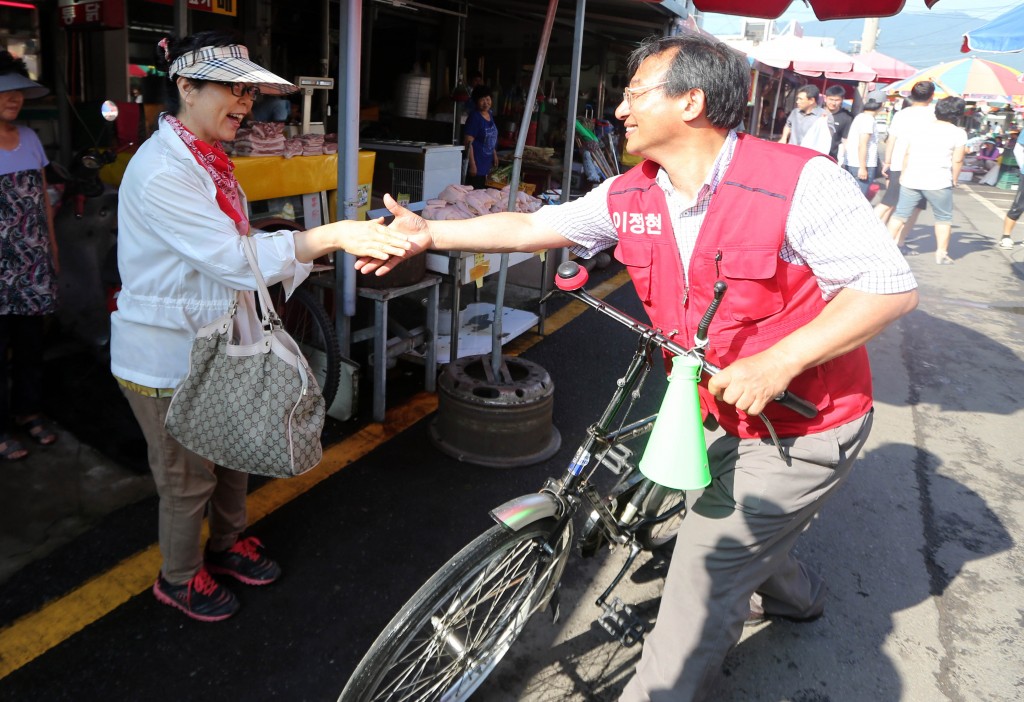- California Assembly OKs highest minimum wage in nation
- S. Korea unveils first graphic cigarette warnings
- US joins with South Korea, Japan in bid to deter North Korea
- LPGA golfer Chun In-gee finally back in action
- S. Korea won’t be top seed in final World Cup qualification round
- US men’s soccer misses 2nd straight Olympics
- US back on track in qualifying with 4-0 win over Guatemala
- High-intensity workout injuries spawn cottage industry
- CDC expands range of Zika mosquitoes into parts of Northeast
- Who knew? ‘The Walking Dead’ is helping families connect
No small miracle
By Kang Seung-woo
Regional rivalry — setting the Jeolla provinces known as Honam against the Gyeongsang provinces called Yeongnam — is often cited as one of the biggest diseases that has sickened the nation’s politics.
Lee Jung-hyun, a former spokesman for President Park Geun-hye, is taking what he calls another “first step” to tackle the old plague by pulling off an improbable victory in Wednesday’s by-elections.
The gravity of this disease is well captured by the fact that the late President Kim Dae-jung, a Nobel Peace laureate, was the biggest victim and largest beneficiary of this regionalism; but Kim couldn’t overcome it even on his deathbed.
The 55-year-old of the Saenuri Party ran in the district of Suncheon and Gokseong, South Jeolla Province and beat Seo Gap-won of the main opposition New Politics Alliance for Democracy (NPAD) by a large margin for his second National Assembly seat. Seo was a close aide to the late President Roh Moo-hyun.
Lee called his win an “election revolution,” while others dubbed it “a miracle,” given that the history of politics in the area, dominated by strong regional loyalties, has seen no lawmaker from the conservative party take an Assembly seat in Gwangju and South Jeolla Province since the single-member constituency was introduced in 1988.
Before the Lee election, regionalism demonstrated its power in almost all elections, with the ruling and opposition parties sweeping races on their home turf.
Political watchers say that the Lee election has paved the way for the breakup of the monopoly of existing political parties based on regionalism.
“The nation was plagued by the solid wall of regionalism although it is the most backward system in party politics,” said Prof. Chung Goon-gi at Hongik University.
“Starting with Lee, however, regionalism is likely to further weaken and we will be able to see opposition party candidates win in the Gyeongsang provinces soon.”
North and South Gyeongsang provinces are “impregnable” fortresses of the ruling party.
Hong Hyung-sik, head of Hangil Research and Consulting, said: “Despite considering Lee’s unique characteristics — his strong ties with President Park — the race was not easy to win and the outcome indicates that competitive candidates will have chances to get elected in the opponents’ strongholds.”
There were recently a few signs that regionalism is waning.
In the June 4 local elections, NPAD candidate Kim Boo-kyum garnered 40.3 percent support in the Daegu mayor election — the highest ever cast for an opposition party’ candidate in the region — and he also received an approval rating of more than 40 percent there in the 2012 general elections.
Lee also fell in the same general elections in Gwangju, home to some of the staunchest supporters of the NPAD, but his unsuccessful bid left room to break out of the traditional boundaries after receiving nearly 40 percent support. Lee also ran for a parliamentary seat in 2004, only to earn 1.04 percent support.
When Lee quit the senior secretary post two months ago, he was rumored to be running in Seoul’s Dongjak-B district.
However, amid an intraparty backlash, he decided to attack the enemy’s stronghold and eventually hit jackpot.
Now, on the back of his billing as the party’s lone lawmaker from the Jeolla provinces, Lee is expected to establish himself as a key figure in the ruling side.
According to a Saenuri Party official, Lee is now consider to be fit for membership of the party’s Supreme Council. In addition, Lee, the president’s close aide, is expected to serve as a mediator between Cheong Wa Dae and the ruling party.
However, experts said that Lee’s ascent could discomfort Saenuri Chairman Kim Moo-sung, who took the helm last month and has tried to refurbish the party, centered on him.
“It will not be easy for Kim to raise his own voice that is different from that of the government due to Lee’s presence. The party leadership may shift to Lee, as well,” Hong said.














